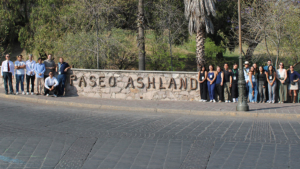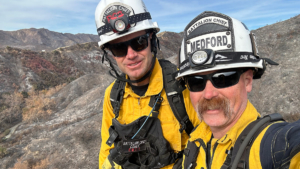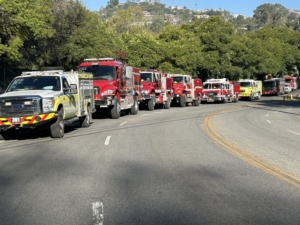(Ashland, Ore.) — Achieving success wasn’t the issue for Taran Cross. He had risen to the position of vice president with a Medford-based healthcare technology company, despite dropping out of college soon after he began back in 2007. But he had unfinished business and higher ambitions.
“I dreamed of going to Oxford as a kid and, around 2018, I started having these profound feelings of regret that I hadn’t been the sort of person who could accomplish those dreams,” Cross said. “I felt like the opportunities of my life had passed me by and, despite having a successful career, that I had squandered my potential.
“Applying to SOU was my way of rejecting that negative thinking. I decided that I wasn’t going to let the failures of my past define me, and live the rest of my life with regret. If I wanted to go to Oxford, I was the only person who could stop me.”
Cross applied for and was accepted into SOU’s Innovation and Leadership Program for working professionals in January 2021, and graduated last spring with a pair of bachelor’s degrees – in Innovation and Leadership, and in History. And as for that dream of attending Oxford University? Well, soon after earning his bachelor’s degrees he applied for admission into a master’s degree program in history at Oxford – and learned recently that he has been accepted.
“I didn’t often tell people that was my goal while at SOU because, even to me, it seemed far-fetched,” Cross said. “It honestly felt almost silly to articulate. How could a former college dropout be accepted to the best university in the world?
“However, the loftiness of the goal drove me to put everything I had into every class I attended, because I knew that the cards were stacked against me. I think success often requires both luck and just enough delusion to believe something is possible without being oblivious to the difficulties that lie ahead.”
The first missteps, and moving forward
Cross acknowledges that his academic pathway, like those of many students in the multidisciplinary Innovation and Leadership Program, was “a bit unorthodox.” The SOU program offers an accelerated bachelor’s degree – completed either in-person or fully online – for working professionals hoping to develop skills in academic areas such as organizational leadership, project management, systems thinking, communication, emerging media and data management.
Cross first enrolled in college following his high school graduation in 2007, but dropped out early in 2008. “Roughly 15 years passed and while I regretted failing in college, I didn’t really have a strong desire to go back until around 2018 or 2019,” he said.
Meanwhile, he learned on the fly and developed a career. He took a short-term job at the Oregon Shakespeare Festival shortly after leaving college, then several months later began the first in a succession of technology-related positions – first at a computer forensic services firm, then back at OSF and then at a Medford computer support and services business. He began as an applications support specialist in 2014 at PLEXIS Healthcare Systems, and by March 2019 he had risen to vice president of client and information services at the Medford-based company.
But he couldn’t shake the feeling that there was something more. He was nagged by his failed attempt at college, had a growing commitment to self-improvement and felt that there must be a more meaningful role for him. So he took the first step toward a return to college, registering in fall 2020 for a single, lower-division class in SOU’s History Department to measure his merit as a student.
“I didn’t anticipate how much I would love that class or the process of examining historical sources,” Cross said. “Professor (Sean) McEnroe’s love of history is genuinely infectious, and I quickly realized that this is what I wanted to do with the rest of my life – and that SOU was the place to train me how to do it.”
He began looking into the best avenue for working on his degree while continuing in his position at PLEXIS, and discovered the university’s INL program. He set up a call with Moneeka Settles, the program’s coordinator, and realized immediately that it was his best route toward academic success and improvement as a business leader.
“She ended up inviting me to join her Organizational Communication class, which started about an hour later (after the call),” Cross said. “I felt once again I had stumbled into the perfect place.”
Two degrees, and much more
The Innovation and Leadership Program provided the academic pathway that Cross needed as a working professional, but it was his love of history that motivated him. Even as he was working his way up the corporate ladder, Cross was captivated by history – particularly the biographies of presidents and other historical figures who have exercised power. At the time, he visualized himself communicating that type of “popular history” to the general public.
“However, SOU exposed me to the variety of historical fields and their corresponding methods,” Cross said. “It was in classes like professor McEnroe’s ‘Global History of Slavery’ that I started gravitating toward subaltern (lower status) studies.
“It was one of those really life-changing classes that shifted my perspective and interests. I now fully intend to make the study of slavery my life’s work, looking for what Jenny Sharpe (author of ‘Ghosts Of Slavery: A Literary Archaeology of Black Women’s Lives’) calls ‘the stories that are being withheld’ in the historical narrative.”
Cross also gained appreciation for historiography – what he calls “the history of the study of history” – and his capstone project taught him to search archives and manuscripts to find “little pieces of forgotten history” that add texture to a larger tapestry.
“I discovered this new interest in Professor (Hannah) Archambault’s classes, where she does a phenomenal job getting students into historiography,” Cross said. “One of the main things I find exciting about pursuing history as a career is participating in these debates and making a serious contribution to the historiography.”
Those pursuits of historical knowledge were complemented by courses Cross took in the Innovation and Leadership Program, which focused on skills such as effective communication, organizational understanding and emotional intelligence.
“I think Moneeka (Settles) has done a remarkable job creating a program that is not only accessible to returning students, which is no simple task, but provides the exact kind of training every individual needs to be successful in the modern workforce,” he said.
In the end, the former college dropout graduated summa cum laude – with highest honors – in last June’s SOU Commencement ceremony, with bachelor’s degrees in Innovation and Leadership, and History.
“He did very well in both programs, studied abroad for a semester, and after graduating, applied to graduate school,” Settles said. “His acceptance at Oxford is unprecedented.”
Graduate studies in the UK
Cross’s study abroad program in 2023 was at University of Nottingham, about 100 miles north of Oxford. He expects that experience to be helpful in his transition to life and studies at Oxford University, where he will begin his master’s degree program in October at Oxford’s Corpus Christi College, studying British and European history of 1700 to 1850.
But just getting his foot in the door of the English-speaking world’s oldest university was a “practically indescribable” accomplishment. Cross felt he “left everything out on the field” when he applied to the Oxford program, but he still was uncertain how it would play out. Then the acceptance email arrived.
“I was actually in a work meeting when the email came in, and had to excuse myself to leap around my office in joy and legitimately cry with happiness,” he said. “I was so emotional, both because this is such an unbelievable opportunity and because I proved to myself that I am capable of accomplishing my dreams.”
His ultimate plan is to earn his master’s degree from Oxford, then apply to the university’s doctoral program in history, before finding a position focused on research and writing about British colonialism in the Caribbean – particularly around slavery and the experiences of the African community.
The entire Oxford experience promises to be the second-most exciting of the year for Cross.
“I’m getting married later this summer to my loving and supportive partner, Hayley Dixon, who will be joining me in Oxford along with our wonderful, goofball dog, Gus,” he said.
-SOU-








 The 18 combined students from the two universities spent the past week researching and analyzing three Guanajuato businesses before concluding the visit by offering suggested development plans to the business owners. The students will reunite for a week in Ashland beginning on April 26, to provide the same services to three Rogue Valley businesses or organizations.
The 18 combined students from the two universities spent the past week researching and analyzing three Guanajuato businesses before concluding the visit by offering suggested development plans to the business owners. The students will reunite for a week in Ashland beginning on April 26, to provide the same services to three Rogue Valley businesses or organizations.


 “The Group Dynamics material allowed me a deeper understanding of the root of the difficulties, which will lead to a change in how I will address similar situations moving forward,” Cohee said.
“The Group Dynamics material allowed me a deeper understanding of the root of the difficulties, which will lead to a change in how I will address similar situations moving forward,” Cohee said.